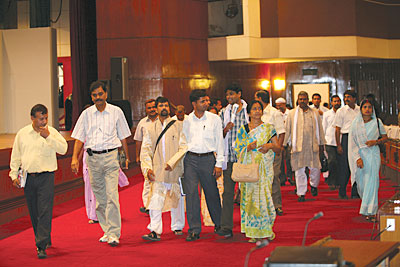 KIRAN PANDAY |
The absence of Madhesi leaders in negotiations that would determine the future of the country was striking. It was symbolic of the steady erosion of Madhesi political strength.
Madhesi parties complain this is because the 'pahadi parties' have monopolised decision-making. Their exclusion from the now-defunct High Level Political Mechanism is cited as proof of the Kathmandu mindset.
But the whining is pointless. No one willingly shares power in politics. Power has to be created. Madhesi parties did that in 2007 and 2008 through agitations. They exercised power after the elections with their impressive numbers. If they are not seen as worthy of even consultations now, they should reflect within about what has changed.
The first reason for the dip in their relevance is the continued fragmentation of Madhesi parties. This is natural, given the heterogeneous social structure of the Madhes. No one party has sought to build a broad-based alliance; the under-representation of Madhesi Dalits, Muslims, non-Yadav OBCs and Tharus is a pointer to how there will be even more forces in the future. These parties are also top-heavy and the egos of all leaders cannot be reconciled within a single party framework.
But the India-encouraged split in the MJF last year was a turning point. It shrank the Madhes' bargaining power drastically, and led to widespread popular disillusionment in the Tarai. It also resurrected the conservative social forces of the region. Note that most ministers from MJF(D) in this government had nothing to do with either of the Madhes movements, are implicated in massive corruption cases, come from feudal 'jamindari' backgrounds, and only joined Madhesi politics before the elections to cash in on popular sentiment.
The second reason is that Madhesi parties have been subsumed under the 'national' Maoist-non Maoist polarisation, which has been framed as a battle between authoritarianism and democracy. 'Madhes issues' have been relegated to the background.
MJF(D), TMDP and Sadbhavana see NC and UML as natural allies in the fight to preserve democracy. Upendra Yadav's MJF feels the 'save democracy' rhetoric is a trap to block political change and impose a 1990s-type system. It views the Maoists as natural allies in the quest for federalism and inclusion. Privately, even top TMDP leaders admit that the Maoists are more supportive of their agenda, as seen in CA committee deliberations and their federal map, which has a Madhes province. But they cite Maoist violence, radicalism and anti-Indianism as stumbling blocks towards any understanding with them. The unstated reason is also the conflicting social bases of Madhesi parties (largely upper and intermediate castes) and the Maoists (extremely backward castes, Dalits, landless, janjatis and pahadis) in the Tarai.
India's real or perceived leverage over Madhesi parties has also harmed its standing in Kathmandu power politics. NC, UML and even the Maoists do not quite see the point of engaging with Madhesi leaders when the sense is that Madhesi parties will toe the Indian line. By and large, this is a correct assessment. A Madhesi leader told an Indian official recently, only half-jokingly, "We have put all our issues in a basket and handed it to you. Now it is your responsibility. Once you have dealt with the Maoists, address those as well!"
Support from India helps Madhesi parties and individual leaders in many ways, and is based on the extremely strong and dense links between India and the Tarai. But the resulting lack of autonomy has its pitfalls. The Madhes is but a card for India in its larger strategic objective of having a friendly regime in Kathmandu. The dip in violence by armed groups in the Tarai since Madhav Nepal took over is not a coincidence and reflects how India will use, or defuse, Madhesi forces according to its convenience.
As the controversy over the next PM sharpens, there is a buzz in Madhesi circles about how it is their turn to lead since the top three have failed. Mahant Thakur's name as a compromise candidate has been floated. Nothing can be ruled out in Nepali politics, but he or some other Madhesi leader would have stood a far greater chance if they had been more pro-active, united, autonomous, and connected to their roots.
READ ALSO:
GOOOOAAAAL?
Life support, Publisher's note
The intellectual dilemma, Mohan Bikram Singh
Blow your own trumpet, Indu Nepal
The partisan press, CK Lal
Making work work, Ashutosh Tiwari
350 days for new constitution, Ass



